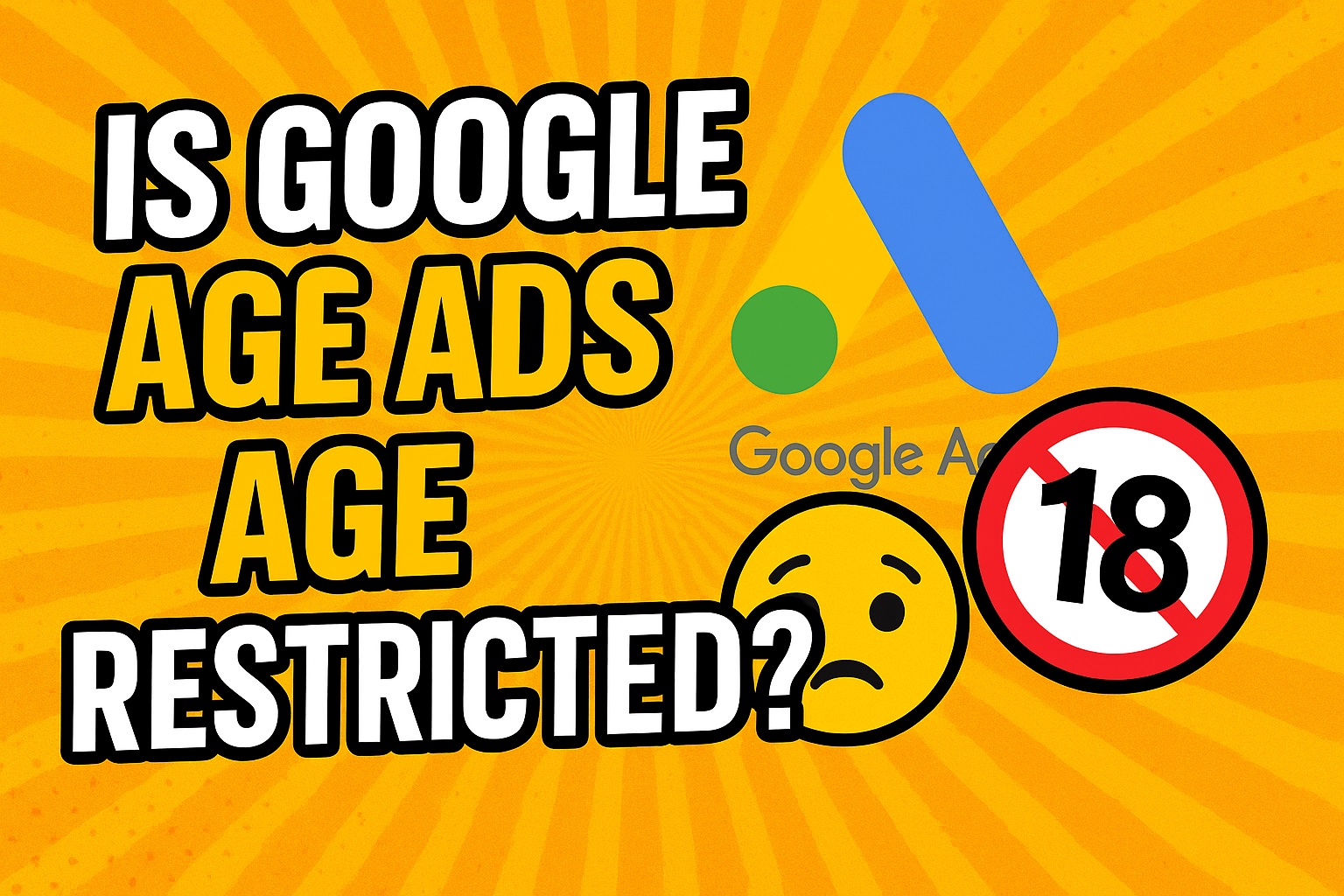Google Ads is a powerful advertising platform, but it operates under strict policies, including rules around age restrictions. These policies ensure that ads comply with legal requirements and protect certain audiences, particularly minors, from inappropriate content. Whether you’re a new advertiser or running campaigns in sensitive industries like alcohol, gambling, or adult products, understanding Google Ads’ age-related rules is essential for compliance and campaign success. This article explains the key age-related requirements for advertisers, how age targeting works in Google Ads, and specific restrictions for industries subject to legal age limits.
Google Ads Age Requirements for Advertisers
To create and manage a Google Ads account, advertisers must meet a minimum age requirement. Google’s policy states that an individual must be at least 18 years old to hold a Google Ads account or enter into an agreement with Google for advertising services. This requirement ensures that advertisers can legally enter into binding contracts.
In addition, Google enforces this rule globally, regardless of the age of majority in a specific country. Even if local law defines adulthood at a younger age, Google maintains 18 as the minimum age for advertisers.
Businesses and organizations can hold Google Ads accounts provided the person responsible for managing the account meets this age requirement. Google also reserves the right to suspend or terminate accounts if it finds that an advertiser has misrepresented their age or is otherwise ineligible under its terms.
How Age Targeting Works in Google Ads
Google Ads allows advertisers to target audiences based on age ranges, helping brands reach demographics that align with their products or services. Age targeting options typically include segments such as 18–24, 25–34, 35–44, 45–54, 55–64, and 65+. Advertisers can also exclude certain age groups from seeing their ads.
However, Google’s age demographic data is not perfectly precise. The platform relies on a mix of user-provided information, browsing behavior, and machine learning to estimate age, meaning there can be inaccuracies. Advertisers should be cautious when designing campaigns that rely heavily on precise age targeting, particularly where legal compliance matters.
Importantly, Google prohibits targeting ads at individuals under 18 for certain sensitive categories, such as gambling, alcohol, and adult content. Additionally, some products and services cannot be promoted to minors at all, regardless of targeting settings.
Advertisers are responsible for ensuring their campaigns comply with these rules, even if Google’s targeting tools are imperfect. Google advises reviewing its personalized advertising policies and any applicable local laws before running campaigns with age targeting.
Industry-Specific Age Restrictions in Google Ads
Certain industries are subject to strict age-related advertising restrictions on Google Ads, due to legal requirements and Google’s own policies.
- Alcohol Advertising:
Ads promoting alcoholic beverages must comply with both local laws and Google Ads policies. In many countries, these ads must be restricted to audiences aged 18 or older (or 21+ in jurisdictions like the U.S.). Additionally, alcohol ads can’t target audiences primarily made up of minors, and creatives must avoid depicting irresponsible drinking behavior. - Gambling and Betting:
Gambling-related ads — including online casinos, sports betting, and lotteries — are heavily regulated. Advertisers must apply for Google certification before running these ads and ensure they are not shown to users under 18 (or the local legal age for gambling). Many countries have complete bans or additional restrictions on gambling ads. - Adult Content:
Ads promoting adult content or services (e.g., dating sites with adult themes, sexual wellness products) face strict restrictions. These ads must never target minors and are often limited in where they can appear on Google’s ad network. - Financial Products:
Some financial services, such as payday loans, are restricted by Google’s advertising policies and must ensure that their ads are not misleading or targeted toward vulnerable audiences, including minors. - Regional Variations:
Google enforces local laws in every country where its ads are shown. For example, legal drinking ages vary globally, and gambling may be entirely prohibited in certain regions. Advertisers must understand the rules in each target market, as Google will apply these standards automatically and may disapprove ads that violate them.
Best Practices for Complying with Age Restrictions
To ensure compliance with Google Ads’ age-related policies and avoid disapproved ads or account suspensions, advertisers should follow these best practices:
- Understand and apply local laws:
Always review legal age restrictions for your industry in every country where your ads will appear. Google enforces these laws, and ignorance won’t protect advertisers from penalties. - Use Google’s targeting tools appropriately:
Exclude age groups that cannot legally engage with your product or service. For instance, if promoting alcohol, explicitly exclude users under 18 or 21 as required. - Request required certifications:
For regulated industries such as gambling, obtain Google’s required certifications before running campaigns. Certification ensures that your ads comply with both Google policies and local legal standards. - Monitor campaigns regularly:
Policies and laws can change. Regularly review your ads, targeting settings, and Google’s policy updates to stay compliant. - Craft compliant creatives:
Ensure that ad content is appropriate for the intended audience. Avoid language or visuals that appeal to minors when advertising age-restricted products.
By following these practices, advertisers can minimize the risk of ad disapproval and maintain a compliant advertising presence on Google Ads.
Conclusion
Google Ads imposes strict rules around age to ensure responsible advertising and compliance with global laws. Advertisers must meet the platform’s minimum age requirement of 18 to open an account, use age targeting responsibly, and adhere to specific restrictions for industries such as alcohol, gambling, and adult content. Understanding these policies is essential for running effective and compliant campaigns. By applying best practices and staying informed about legal requirements, advertisers can protect their accounts, reach appropriate audiences, and build trust with their target markets.
